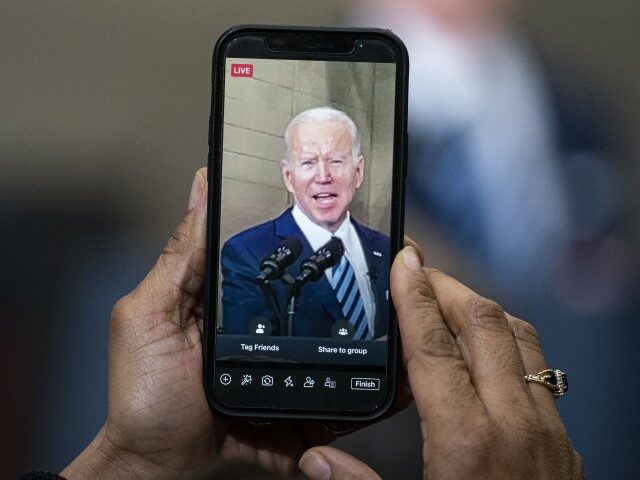President Joe Biden’s administration argued in favor of big tech platforms’ legal immunity to censor free speech on their platforms.
The Supreme Court heard two cases involving challenges to red state laws that sought to rein in social media censorship. The broader of the two, Netchoice v. Paxton, involves a big-tech funded group, NetChoice, seeking to overthrow a Texas law to protect its citizens from censorship. The other, Moody v. Netchoice, challenged a Florida law which prohibited big tech censorship of political figures.
Justice Clarence Thomas asked Paul Clement, the industry group’s attorney, why, if they win the cases against Florida and Texas, it would not a present a Section 230 problem for them. Section 230 of the Communications Decency Act is designed to allow platforms to have legal immunity from hosting content on the internet. However, many experts have argued that the law’s overly broad language grants big tech companies too much leeway to censor.
Clement argued that liability protection and the First Amendment “don’t go hand in hand.”
Justice Samuel Alito asked if the Florida law would also apply to Gmail, seeking to find out if the law satisfied the requirements around the overbreadth doctrine, in that if a law is so overly broad it deters free expression, then it can be struck down because of its chilling effect.
He asked Clement, “All right. So does Gmail have a First Amendment right to delete, let’s say, Tucker Carlson’s or Rachel Maddow’s Gmail accounts if they don’t agree with her — his or her viewpoints?”
Justice Brett Kavanaugh argued that when the government censors free speech, it is considered a violation of the First Amendment; however, he said, when a private entity does this “that’s protected generally editorial discretion, even though you could view the private entity’s decision to exclude something as ‘private censorship.'”
Kavanaugh also argued:
The First Amendment stands against that. “However much validity may be found in these arguments, at each point, the implementation of a remedy calls for some mechanism, either government or consensual. And if it’s governmental, that’s just one brings about a confrontation with the express provisions of the First Amendment. Compelling editors or publishers to publish that which reason tells them should not be published is what is at issue in this case.”
U.S. Solicitor General Elizabeth Prelogar told the Court that the Biden administration opposes the Texas and Florida laws, viewing them to be unconstiutional restrictions on big tech’s “expressive product.”
She said:
These are websites featuring text elements, speech elements, photos, videos, and the platforms, which are private parties not bound by the Constitution, are deciding how they want that to look — what content to put on it, and in what order. That’s an inherently expressive act.
“The critical difference here, of course, is that these platforms are private parties, they’re not bound by the First Amendment,” Prelogar added.
“Especially for Florida, some justices expressed concern that this was brought as what is called a facial challenge, which would strike down those laws entirely,” Breitbart News senior legal contributor Ken Klukowski observed. “One option is that the court could side with one or both states in this round, then let NetChoice amend one or both lawsuits into a much narrower attack, and allow the lower courts to take a second look at what would then be called an as-applied challenge.”
The cases are Netchoice v. Paxton, No. 22-555, and Moody v. Netchoice, No. 22-277, in the Supreme Court of the United States.
Sean Moran is a policy reporter for Breitbart News. Follow him on Twitter @SeanMoran3.

COMMENTS
Please let us know if you're having issues with commenting.